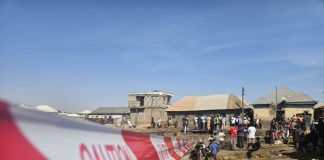If Tizhe Kwatri had known that his daughter would die and her twin would suffer a spinal injury affecting her mobility, he would have hugged them a little longer that morning, or perhaps not let them go to school at all. He would have begged them to stay home.
But Tizhe was no fortune-teller. There were no ominous events the day before, no strange signs he could interpret. And now, it haunts him.
“It might haunt me for the rest of my life,” he tells JoeyOffAir.
That Friday morning, on June 12, 2024, Tizhe’s 15-year-old twins, Benitha and Betta, sat quietly in their biology class on the ground floor of a two-storey building, revising for their SS1 promotional exams at Saints Academy in Busa Buji, a suburban community in Jos North, Plateau State in Central Nigeria. Suddenly, the ceiling began to shudder.
In a thunderous instant, the floor above gave way and collapsed on them. A chain reaction followed. The floors pancaked, one on top of another. Steel beams, once rigid, bent and split with a metallic shriek. Hallways became tunnels of rubble. Lockers crumpled. Within seconds, a section of the building had disintegrated into a mound of debris.
The impact killed Betta.
Twenty-one other students died. Hundreds more were trapped and later rescued by emergency teams, according to local authorities.
Benitha gasped for air, unable to feel her legs beneath the crushing weight of a column lodged against her waist. Coughing beneath a cloud of pulverised concrete drifting through the ruins, she reached into the darkness, willing her legs to move as she tried to call out for her twin. It was futile.
The last sound Benitha heard before slipping into unconsciousness was the steady tapping of the rescue team searching for survivors.
Engineers later called it a tragedy long in the making, one fuelled by structural decay and regulatory neglect. Students had complained for days that the building shook, but school authorities turned a blind eye.
A federal investigative panel later confirmed those fears. In a July 2024 preliminary report released by the Nigerian Building and Road Research Institute, experts revealed that weak materials had been used in the school’s construction, and the foundation fell far below standard. The concrete lacked proper bonding with the steel reinforcement. The slab anchorage was inadequate.
The report also faulted the lack of regular inspections and noted, grimly, that no one has ever been held accountable for building collapses in Nigeria, despite dozens of deadly incidents.
Betta’s body was recovered with a strange stillness, her face a facsimile of morbid peace. When her father speaks of it, his voice breaks, his face morphing with unrecognisable anguish as his eyes become misty.
“She looked like she was sleeping. Betta was the quiet one. She was kind and selfless,” Tizhe says, often mixing up their names in frenzied anguish. He had been at the provision store he managed when the call came; his daughters had been involved in a school building collapse. He dashed to the scene, praying it was a cruel rumour. It wasn’t.
Benitha sustained a spinal injury in the collapse that left her unable to walk. She spent more than a month in the hospital, grieving her sister’s death while adjusting to a new and painful reality. The memory of that day still haunts her; she draws a ragged breath whenever she speaks of Betta.
She recalls playing with friends on the badminton court, but now she can’t. “I played very well, and my team always won. I also participated in the march past for the yellow house,” she says as her eyes wander to the wheelchair that now supports her daily mobility.

Her older sister, Janet, has become her primary caregiver, managing the physical and emotional demands that come with Benitha’s condition.
“It has not been easy for her, but she’s brave and has shown great courage,” Janet says.
The weeks have split into months and months into a year, but Benitha’s reality still jars her. Long months of recovery have interrupted her education. Her father, once a shopkeeper, cannot now afford private tutoring, highlighting the need for more accessible education support for persons living with disability in Plateau State.
“I would sell everything just to see her walk again, including this house where we stay,” he says. His eyes are red. More tears follow. Physiotherapy is partly covered by the state, but everything else, ring foam, airbeds, stroller, and backslap, comes from his empty pockets.

A father of 12, Tizhe and his wife once sold provisions and roasted chicken to support their family. But after being evicted from their rented shop due to a change in ownership, he turned to motorcycle (okada) riding to make ends meet. Now, with a ban on okadas in the Jos-Bukuru metropolis, the family is struggling financially, making it even harder to access care and education for Benitha.
Tizhe has written to the state government pleading for support, and while the letter was acknowledged, there has been no feedback.

His frustration mirrors a broader pattern of delayed government response.
After the tragedy, the Plateau State Government pledged to cover survivors’ medical bills, but the hospitals, Our Lady of Apostles (OLA), Jos University Teaching Hospital (JUTH), and Bingham University Teaching Hospital, were left waiting for reimbursement. OLA alone treated 52 survivors for ₦9 million, while JUTH’s bills totalled ₦1.7 million. For nearly a year, the payments remained outstanding, despite repeated follow-ups. It was only after JoeyOffAir began investigating the matter in August 2024 and reached out to the state authorities that the hospitals confirmed on June 24 this year that the long-awaited funds had finally been disbursed.
Tizhe has written to the state government pleading for support, and while the letter was acknowledged, there has been no feedback.

His frustration mirrors a broader pattern of delayed government response.
After the tragedy, the Plateau State Government pledged to cover survivors’ medical bills, but the hospitals, Our Lady of Apostles (OLA), Jos University Teaching Hospital (JUTH), and Bingham University Teaching Hospital, were left waiting for reimbursement. OLA alone treated 52 survivors for ₦9 million, while JUTH’s bills totalled ₦1.7 million. For nearly a year, the payments remained outstanding, despite repeated follow-ups. It was only after JoeyOffAir began investigating the matter in August 2024 and reached out to the state authorities that the hospitals confirmed on June 24 this year that the long-awaited funds had finally been disbursed.







